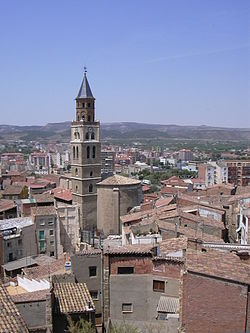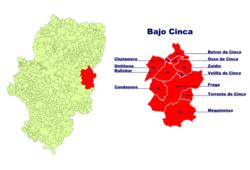Fraga
Fraga | |
|---|---|
 | |
 | |
| Coordinates: 41°31′12″N 0°21′0″E / 41.52000°N 0.35000°E | |
| Country | |
| Autonomous community | |
| Province | Huesca |
| Comarca | Bajo Cinca |
| Judicial district | Fraga |
| Government | |
| • Alcalde | Santiago Burgos Sorolla (2022) (PP) |
| Area | |
• Total | 437.64 km2 (168.97 sq mi) |
| Elevation | 118 m (387 ft) |
| Population (2018)[1] | |
• Total | 14,979 |
| • Density | 34/km2 (89/sq mi) |
| Demonyms | Fragatino, -na Fraguense |
| Time zone | UTC+1 (CET) |
| • Summer (DST) | UTC+2 (CEST) |
| Postal code | 22520 |
| Website | Official website |
Fraga (Spanish: [ˈfɾaɣa] ; Catalan: [ˈfɾaɣɛ]) is the major town of the comarca of Bajo Cinca (Catalan: Baix Cinca) in the province of Huesca, Aragon, Spain. It is located by the river Cinca. According to the 2014 census,[2] the municipality has a population of 14,926 inhabitants.
King Alfonso I of Aragon died at its walls in 1134 while trying to conquer it during the Battle of Fraga. It was conquered from the Moors by the Count Ramon Berenguer IV of Barcelona in 1149.
The local language, called Fragatí, is western Catalan.
Historically, there was a Jewish community in Fraga. Jews in Fraga enjoyed civil rights under Muslim rule, which was not always the case in other historical Spanish Jewish communities. They were given autonomy, including the right to defend themselves against attacks and the right to elect their representatives. The community ceased to exist due to the expulsion of the Muslims and Jews in 1492.[3]
History
- Plan of western view of Fraga circa 1779 by Bernardo Espinalt y García
Sights
Spanish Civil War
The town was controlled by anarcho-syndicalists associated with CNT during the Spanish Revolution of 1936. They carried out collective farming, price controls, wartime rationing, interest-free banking, sanitation programs, public works, tree planting and the establishment of a nursing home. The town hospital was enlarged from 20 beds to 100, and running water was provided to the hospital for the first time to combat Typhus.[4]
Demography
Population evolution along the years

| Population trend between 1991 and 2018 | ||||||
|---|---|---|---|---|---|---|
| 1991 | 1996 | 2001 | 2004 | 2006 | 2013 | 2018 |
| 11491 | 11783 | 12100 | 13035 | 13191 | 14834 | 14979 |
Notable People
- Astruc Remoch, prominent converso and critic of Judaism
- Ceferino Giménez Malla, Spanish Romani activist
- Lourdes Casanova, notable academic
See also
- Bajo Cinca/Baix Cinca
- Grace Fraga (Actress Comedian)
- Florida 135, oldest nightclub in Spain
References
- ^ Municipal Register of Spain 2018. National Statistics Institute.
- ^ Instituto Nacional de Estadística (INE)
- ^ "Fraga". Jewish Virtual Library. Retrieved 28 June 2024.
- ^ Leval, Gaston (1975). Collectives in the Spanish revolution. London: Freedom Press.
External links













